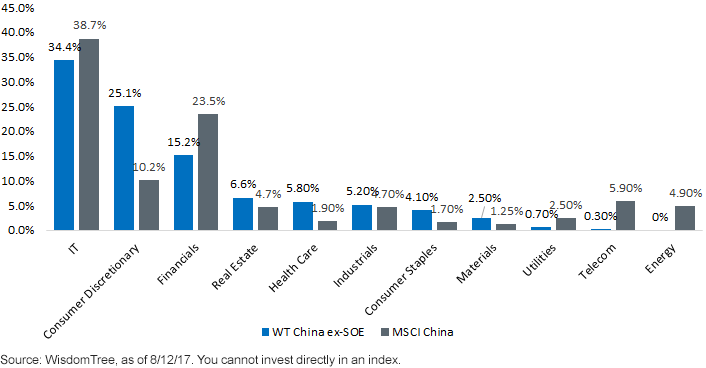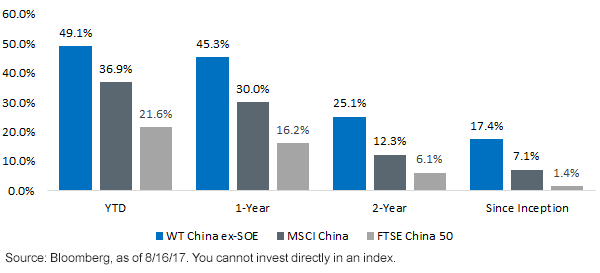Chinese G In ESG: Governance Tilt Yields Strong Returns
In June 2017, WisdomTree and MSCI announced that they would be adding Chinese A shares to their indexes1 in order to broaden the investable universe to include Chinese-listed firms. MSCI will be adding China A shares in June 2018, whereas WisdomTree implemented these changes to two of its emerging market Indexes on August 11, 2017.
While the inclusion of locally listed firms is certainly a milestone for Chinese capital markets, we believe the listing venue may be of secondary importance in evaluating the merits of a Chinese equity index.
There is a lot of work on various investment factors—things such as value, momentum and quality. One of the big stories is how ownership stakes by the Chinese government are associated with higher levels of leverage, lower quality and Profitability Metrics; deep concentration in state-run banks; and potentially conflicted corporate governance (the G in ESG: environmental, social and governance) as it relates to shareholders’ best interests.
Below, we highlight a recent development for Hong Kong-listed firms that exemplifies these issues.
The State of State-Owned Enterprise (SOE) Reform
Beginning in the early 1990s, the Chinese government began a slow-moving process whereby state ownership in certain sectors of the economy would be reduced. Fast forward to 2013 and SOE reform was supposedly at the top of President Xi Jinping’s list. While the market appeared hopeful, progress on this front remains unclear. The government’s plan broke down SOE reform into 34 distinct initiatives that would be governed by a number of state agencies. Those agencies have in turn published at least 36 different plan supplements and launched 21 different reform trials.2
For markets, it appears as though President Xi wanted firms to be more efficiently managed, but only if that efficiency led to higher returns to the government. Similarly, leaders in Beijing have prioritized combining smaller firms to form larger, national champions as opposed to fostering growth. Although it may have been naïve to think that reform could mean privatization, state control has remained stubbornly entrenched in so-called strategic industries such as natural resources, financials, and telecom.
Troubling Exports: Corporate Governance in Hong Kong
As long-hoped-for shareholder-friendly reforms stalled, many investors simply accepted that SOEs were run as much for government benefit as their own. Recently, this has been formalized through the amendment of corporate charters on the mainland that appoint Communist Party committees to an oversight capacity of corporate boards. The obvious concern is that business interests could take a back seat to government priorities and initiatives.
While these conversions remain ongoing, 32 state-owned enterprises listed in Hong Kong, which account for over $1.25 trillion in market value (32% of the Hong Kong market), have undergone this shift.3 Time will tell how the government will balance corporate interests with those of the government.
In March 2015, WisdomTree sought to create an index that would provide exposure to Chinese equities but limit co-investing alongside the Chinese government: the WisdomTree China ex-State-Owned Enterprises Index. As a result, our Index will not invest in companies with more than 20% government ownership. In our view, companies that are less subject to government interference may lead to a significant divergence in returns—and at the very least our Index has a different sector mix and diversification than traditional market indexes.
Sector Differences by Limiting Investment in SOEs

As we show above, by limiting exposure to SOEs, investors can significantly reduce exposure to the Chinese Financials, Telecom and Energy sectors while boosting exposure to the Chinese Consumer Staples and Health Care sectors. This differentiated sector exposure has been a primary driver of our return advantage over time.
Additionally, as China seeks to transition its economy from export-led growth to domestic consumption, we believe our Index better reflects the “new” china economy versus “old” China. In the chart below, we show the sizable performance differential between WisdomTree’s ex-SOE strategy, the MSCI China Indexand the FTSE China 50 Index. As you can see, over every time period, limiting to exposures to SOEs has helped to boost returns and limit volatility.
WT China ex-SOE vs. MSCI China vs. FTSE China 50

Ultimately, investors will need to decide if their financial interests will always remain aligned with members of the Chinese government. While it may be impossible to fully limit the influence of the government on Chinese firms, limiting exposure to SOEs could prove prudent should current trends in globalization continue or intensify. And at the very least, the sector differentials in the ex-state-owned version of China yields a more consumer-oriented future of the country compared to the traditional state-run banks and energy firms in older China indexes. ESG investing is becoming more mainstream, and for China, focusing on the G in ESG has made a quantifiable difference.
1WisdomTree China ex-State-Owned Enterprises Index, MSCI Emerging Markets Index, MSCI China Index.
2"Reform of China’s Ailing State-Owned Firms Is Emboldening Them,” The Economist, 7/22/17.
3See, for instance, Tom Mitchell, “China’s Communist Party Writes Itself into Company Law,” Financial Times, 8/14/17.
Disclaimer: Investors should carefully consider the investment objectives, risks, charges and expenses of the Funds before investing. U.S. investors only: To obtain a prospectus containing this ...
more


